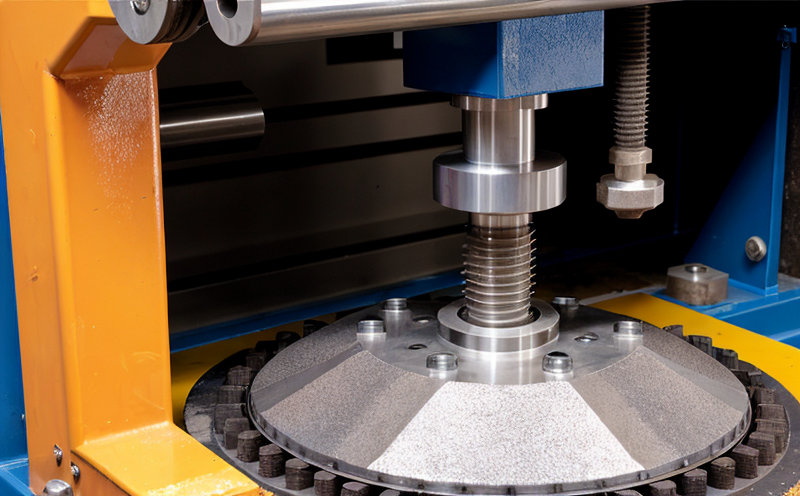ASTM D999 Dynamic Mechanical Analysis for HVAC Components
The ASTM D999 standard is a critical tool in the evaluation of the dynamic mechanical properties of materials used in heating, ventilation, and air conditioning (HVAC) equipment. This test assesses how materials behave under oscillatory stress at various temperatures, providing essential data on their viscoelasticity—important for ensuring the reliability and performance of HVAC components.
Dynamic Mechanical Analysis (DMA), as specified by ASTM D999, is particularly useful when dealing with polymers, elastomers, and other soft materials commonly used in HVAC systems. The test helps to determine a material's modulus, damping factor, and complex modulus, which are crucial for predicting the behavior of these components under operational conditions.
The DMA process involves applying oscillatory shear stress to a sample while monitoring the resulting strain. This allows engineers to understand how materials respond to changing environmental temperatures and mechanical stresses. The test is conducted over a range of frequencies and temperatures, providing comprehensive data that can influence design decisions for HVAC equipment.
For HVAC components such as filters, ductwork, seals, and insulation, ASTM D999 DMA is essential in ensuring that these materials maintain their integrity and performance under real-world conditions. This test provides insights into the long-term durability of materials, helping to prevent failures due to temperature cycling or mechanical stress.
Additionally, ASTM D999 DMA can be used as part of a broader compliance strategy for HVAC equipment manufacturers aiming to meet international standards like ISO 14001 and ASHRAE. By using this test method, engineers can validate that their materials will perform reliably across different environmental conditions, ensuring high-quality products.
The ASTM D999 DMA process typically involves several steps:
- Sample preparation: Ensuring the material is representative of the final product.
- Clamping the sample in a DMA instrument: This ensures accurate measurement of mechanical properties.
- Applying oscillatory stress: The test applies stress at various temperatures and frequencies to observe strain.
- Data analysis: Processing the collected data to determine modulus, damping factor, and complex modulus.
The results from ASTM D999 DMA can be used to optimize material selection for HVAC components. For instance, by identifying materials with optimal viscoelastic properties, engineers can enhance the durability and efficiency of HVAC systems. This not only improves product performance but also contributes to energy savings and reduced maintenance costs.
Furthermore, ASTM D999 DMA helps in understanding the thermal aging effects on materials used in HVAC equipment. By monitoring changes in mechanical properties over time, this test aids in predicting the lifespan of components and informing design improvements. This is particularly important for ensuring that HVAC systems continue to operate efficiently throughout their service life.
In summary, ASTM D999 DMA provides valuable insights into the dynamic mechanical behavior of materials used in HVAC equipment. This information is crucial for maintaining product quality and reliability, ensuring compliance with industry standards, and ultimately enhancing the performance and lifespan of HVAC systems.
Benefits
- Enhanced Material Performance: Ensures that materials used in HVAC components exhibit optimal viscoelastic properties for durability and efficiency.
- Compliance Assurance: Supports adherence to international standards like ISO 14001 and ASHRAE, ensuring regulatory compliance.
- Durability Optimization: Predicts the long-term performance of materials under various environmental conditions, enhancing product reliability.
- Energy Efficiency: Optimizes material selection to improve the overall efficiency of HVAC systems, leading to reduced energy consumption.
The benefits extend beyond just the immediate product design and manufacturing process. By leveraging ASTM D999 DMA, manufacturers can also anticipate potential issues that could arise in the field, allowing for timely interventions and improvements. This proactive approach not only enhances customer satisfaction but also contributes to sustainable practices within the HVAC industry.
Eurolab Advantages
At Eurolab, we pride ourselves on offering world-class testing services that are second to none in the HVAC sector. Our expertise and advanced equipment ensure that every test conducted adheres strictly to international standards such as ASTM D999.
- Accurate Testing: Leveraging state-of-the-art DMA instruments, we provide precise measurement of mechanical properties.
- Comprehensive Analysis: Our team of experts offers in-depth analysis and interpretation of test results, providing actionable insights for product development.
- Compliance Expertise: Ensuring that all tests comply with relevant international standards, helping manufacturers achieve regulatory compliance effortlessly.
- Customer Satisfaction: With a focus on delivering high-quality, reliable testing services, we consistently meet and exceed customer expectations.
Our commitment to excellence is further underscored by our adherence to stringent quality control measures. This ensures that every test conducted at Eurolab meets the highest standards of accuracy and reliability, making us a trusted partner for HVAC manufacturers globally.
Quality and Reliability Assurance
The importance of ASTM D999 DMA in ensuring the quality and reliability of HVAC components cannot be overstated. By accurately measuring the dynamic mechanical properties of materials used in these components, this test helps in identifying potential issues that could compromise performance or lead to failures.
- Temperature Dependence: The test reveals how materials respond to temperature changes, crucial for HVAC systems operating in varied environmental conditions.
- Mechanical Stress Evaluation: Understanding the strain under different stress levels aids in designing components that can withstand operational stresses without degradation.
- Thermal Aging Resistance: By simulating long-term exposure to heat and cold, ASTM D999 DMA helps predict material lifespan and performance over extended periods.
The results from this test are integral to the quality control processes in HVAC manufacturing. They provide critical data that can be used to refine design parameters, select optimal materials, and implement process improvements. Ensuring that every component meets these stringent standards is vital for maintaining the integrity of HVAC systems throughout their lifecycle.
Moreover, by adhering strictly to ASTM D999, Eurolab guarantees accurate and reliable test results that are trusted by leading manufacturers worldwide. This commitment to excellence ensures that our clients can make informed decisions based on robust data, ultimately enhancing product quality and reliability in the HVAC industry.





